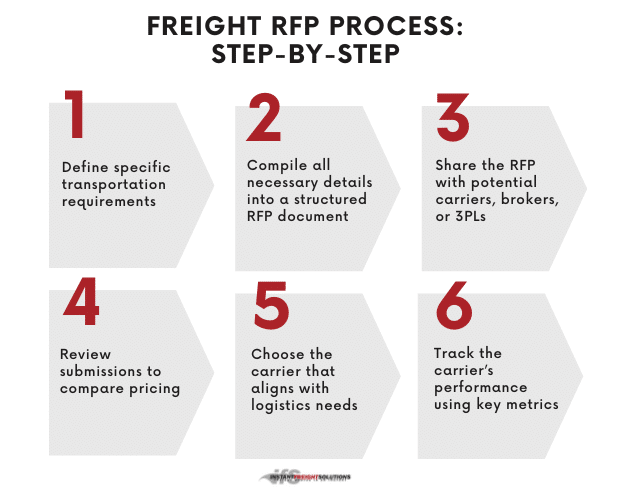What is a Freight RFP and Why Does Your Business Need One?

When it comes to shipping, every dollar counts. Managing freight shipping costs efficiently is crucial for successful logistics operations. One effective way for a shipper to ensure they work with the right freight carriers or logistics providers is through a Freight Request for Proposal (RFP). This formal process allows shippers to gather competitive bids, evaluate potential partners, and secure reliable transportation services specific to their needs.
What is a Freight RFP?
In the logistics industry, a Freight Request for Proposal (RFP) is a tool shippers use to identify and partner with the right freight carriers or third-party logistics (3PL) providers. It is a structured document that outlines specific transportation needs, including freight characteristics, service expectations, and other important details.
Rather than repeatedly searching for carriers whenever a shipment arises, an RFP allows a shipper to share all requirements upfront—such as freight volume, lanes, and delivery schedules. This gives carriers all the information they need to provide accurate quotes and helps the shipper find a partner that matches their logistics goals.
The goal isn’t just to secure the lowest rates but to establish reliable, long-term relationships with carriers that offer consistent value and dependable service.
RFP vs. RFQ vs. RFI
It’s important to differentiate between RFPs, RFQs, and RFIs:
- RFP (Request for Proposal): Focused on detailed proposals that consider service, pricing, and other factors.
- RFQ (Request for Quote): Primarily used to gather price estimates for specific services or shipments.
- RFI (Request for Information): Used to gather general information about a provider’s capabilities.
While each serves a purpose in the freight procurement process, an RFP is the most comprehensive, combining the depth of an RFI with the pricing details of an RFQ.
How Does the Freight RFP Process Work?
The Freight RFP process follows a structured approach, ensuring every detail is accounted for to attract accurate quotes and find the most suitable freight carriers or logistics providers. A well-executed RFP aligns a shipper’s logistics goals with carrier services, optimizing supply chain operations. The more precise the data included in the RFP document, the better the responses. Incomplete information can lead to unsuitable bids, wasted time, and suboptimal partnerships.
Components of a Complete Freight RFP Document
A thorough Freight RFP document establishes clear communication and accurate pricing. Key components include:
- Freight Characteristics: Details about the type of goods, freight volume, and any special requirements, such as temperature control or fragile handling.
- Lanes and Routes: Specifications for origins, destinations, and expected transit times.
- Technology Requirements: Needs for real-time tracking, integration with logistics management systems, or reporting capabilities.
- Contract Terms: Preferred rates, fuel surcharges, service expectations, and any other contractual details.
Steps in the RFP Process

- Identify Needs: Understand transportation requirements, including freight types, volume, destinations, service levels, and lanes.
- Create the RFP Document: Compile all necessary details in a clear, concise format.
- Distribute the Document: Share it with potential partners such as carriers, freight brokers, or 3PLSs, using freight procurement platforms if available.
- Evaluate Proposals: Compare submissions to find the best-fit logistics provider.
- Select a Partner: Choose a carrier that aligns with transportation needs and budget.
- Monitor Performance: Track carrier performance and address issues proactively to maintain a strong partnership.
Questions to Ask Before Creating an RFP
Before starting the RFP process, shippers should consider the following:
- Which lanes or regions are critical to our operations?
- Do we need technology integration from our carrier?
- What is our budget for transportation services?
- What are our pickup and delivery needs?
- How will we evaluate proposals and make decisions?
- Are there special handling requirements, such as temperature control or fragile goods?
- What risks or challenges might arise in the RFP process?
These questions help ensure the RFP document is thorough and tailored to specific logistics needs.
Why Freight RFPs Are a Smart Move for Shippers
By formalizing the process of selecting freight carriers, RFPs offer several advantages to help shippers reduce costs, improve efficiency, and secure reliable transportation solutions. Here’s why freight RFPs are a smart move for shippers:
#1 Cost Savings
Freight RFPs create a competitive environment by inviting multiple carriers to submit proposals. This often results in better pricing, as carriers present their most attractive rates and services. Shippers can then compare costs across providers to identify the most cost-effective option for their business.
#2 Long-Term Carrier Relationships
Freight RFPs are not just about finding the lowest price; they’re also an opportunity to build strategic relationships. By selecting carriers who align with their operational goals, shippers can establish long-term partnerships that drive mutual success.
#3 Customized Logistics Solutions
An RFP allows shippers to find logistics providers that offer transportation modes that match their supply chain needs, whether truckload, LTL, or intermodal transportation. Whether it’s specialized equipment, handling of hazardous materials, or custom routing, shippers can secure services that align with their needs.
#4 Risk Mitigation
The RFP process includes evaluating carriers for compliance with legal and safety standards, insurance coverage, and relevant industry experience. This vetting minimizes risk by ensuring partnerships with reliable and capable providers.
How Freight RFPs Drive Cost Savings for Shippers
A well-run Freight RFP process leads to measurable savings by:
- Identifying competitive contract rates.
- Reducing reliance on expensive spot market rates
- Decreasing tender rejections with clearer communication of freight requirements
- Building partnerships with logistics providers that align with a shipper’s freight needs
Overcoming Common Challenges of Freight RFPs
While Freight RFPs offer many benefits, challenges can arise, including:
- Manual Processes: Managing bids with Excel spreadsheets can be time-consuming and prone to errors.
- Incomplete Details: Missing information in the RFP document can result in inaccurate quotes.
- Managing Multiple Bids: Handling responses from a large carrier network can be overwhelming without the right tools.
- Regulatory Alignment: Ensuring compliance with freight transportation regulations is critical but can be complex.
Partnering with an experienced logistics provider or using freight procurement software can help shippers navigate these challenges.
Ready to Save on Freight Shipping Costs?
At Instant Freight Solutions (IFS), we understand that managing freight can feel overwhelming, but it doesn’t have to be. Our Intelli-Freight platform simplifies everything, giving shippers instant access to the best freight solutions:
- Instant Quotes: Input shipping requirements and instantly receive tailored quotes from our extensive carrier network.
- Customizable Options: Compare carriers, transit times, and freight rates all in one place. Choose the option that works best—whether it’s the fastest transit time, the most affordable rate, or the best balance of both.
- Trusted Carrier Network: Every quote comes from vetted carriers who meet the highest standards for reliability and service quality. Whether it’s a truckload request or intermodal shipping, we connect shippers with the best carrier network to meet their needs.
With IFS, shippers can simplify freight procurement, cut freight costs, and gain peace of mind knowing their logistics needs are met efficiently. What typically takes hours or even days—gathering quotes, comparing carriers, and negotiating rates—happens instantly with just a few clicks.
Contact us today for your logistics and transportation needs.
